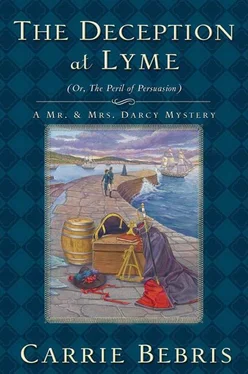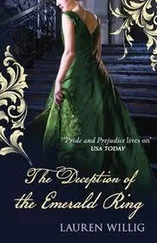“That is entirely possible. A ship is its own floating domain, one that no outsider can fully comprehend without having spent time aboard. Tell me your concerns.”
Wentworth listened as Darcy recounted what he knew of Gerard’s time aboard the Magna Carta —the little information his family had been given at the time of his death, Lieutenant St. Clair’s personal but belated delivery of his sea chest, Darcy’s discovery of the diary and pendant, his recent conversations with St. Clair and Captain Tourner. Wentworth asked occasional questions, his brow becoming increasingly furrowed. When Darcy had done, Wentworth refilled their wineglasses.
“You initiated this discussion by saying that you had questions about your cousin’s death, but a substantial portion of what you have told me pertains to the mysterious appearance of the gold figurines, not the battle.” The captain returned Darcy’s glass to him. “I take this to mean that you suspect the events are related—that your cousin, and perhaps the cook, did not die in legitimate melee with the French, but by the hand of one of their own shipmates?”
“Based on my limited knowledge, I believe it is possible that the battle provided an opportunity for the owner of those artifacts to ensure their existence remained a secret. From what I have told you, do you concur?”
“Unless naval victuals have improved exceedingly since I was in the West Indies, I would certainly describe gold idols in a sugar cask as irregular. One certainly wants to know how they came to be there.”
“Is there any reason someone with a rightful purpose for possessing the objects would hide them in a sugar cask rather than in his sea chest or among his other possessions?”
Wentworth thought a moment. “There is not much privacy on a ship. While officers enjoy more than the men, even an admiral’s belongings are packed up and his furniture moved to the hold in preparation for a battle. An officer’s cabin is dismantled—canvas walls removed, chests and furnishings stowed—to entirely clear the deck for the gun crews. Seamen’s hammocks are rolled up and put to other use, and even when not in battle, several messmates might share a sea chest. So no matter what a man’s rank, there is a great deal of moving things about, by many hands, and not under the immediate supervision of their owners, who are performing their own duties. Whereas items secured in the hold or on the orlop deck, where an officer’s stores would be, stay put until needed or until the voyage ends. So I suppose it is possible that someone might believe treasures such as you describe would be safer in storage.” He paused. “But were they mine, I would secure them in a locked chest.”
“Then I think we can assume that their owner did not come by them honestly, which means their discovery was a threat.”
“Even so, it is a great leap from theft to murder. In the navy, murder is one of the few crimes punishable by death—usually hanging.”
“Is that not all the more reason why the mayhem of battle would provide an ideal opportunity for a thief fearing exposure to commit one—or two—with little risk of being caught? And is it not further possible that in the fervor of battle, if a chance to silence someone who knew too much suddenly presented itself, the thief might seize it without pausing to consider the consequences?”
“It is,” Wentworth conceded. “But we also cannot dismiss the possibility that however wrongfully the artifacts might have come to be in that cask, the deaths of your cousin and the cook could have been the legitimate result of battle.”
“I agree. I am not seeking an individual to blame for my cousin’s death if no one is guilty of it. The French collectively provide a sufficient object of resentment. And in truth, I would rather remember Gerard as having died for the preservation of England, than for private greed. However, if this discovery cost him his life … I want to know.”
“You and Mrs. Darcy saved my godson’s life; the least I can do is help you put to rest questions about your cousin’s death. I suppose we should begin with who beyond Lieutenant Fitzwilliam and the cook knew about the idols.”
“Lieutenant St. Clair, who allegedly was going to raise the issue with the captain after his dinner guests left the ship.”
“Have you directly asked Lieutenant St. Clair or Captain Tourner about the artifacts?”
“I thought it best not to betray my knowledge of them.”
Wentworth nodded. “That was prudent, until we have a better sense of what—and whom—we are dealing with. I know Tourner by reputation only, and St. Clair not at all. Did the latter mention other captains under whom he has served?”
“Only a Captain Croft, who I understand is an admiral now.”
“Yes, he is rear admiral of the white—and my brother-in-law. Did St. Clair serve under him as a lieutenant?”
“A midshipman.”
“Croft should be able to give us a better sense of St. Clair’s character—at least, St. Clair in his younger years. Naval life can change a man. He might also be familiar with Captain Tourner. As luck would have it, Mrs. Wentworth and I will see the Crofts this week; I can speak to the admiral then. Now, who else might have known about the gold figures?”
Gerard’s diary had not indicated that any other individuals learned of them from him or the cook. Darcy pondered broader possibilities. “How would any cask of sugar have gotten aboard the ship? Who would have handled it?”
“The cask would have been loaded with the other provisions within a few days of leaving port—rats are enough of a nuisance once at sea; there is no reason to give them an early start at the food. Since this was a cask purchased for the wardroom mess, it would have been stored below in an area reserved for the lieutenants’ provisions, and brought up to the galley when needed.”
“If St. Clair acted as caterer for the mess, would he have overseen the loading?”
“It is not inconceivable. However, as first lieutenant he had more important responsibilities, so I expect someone else oversaw the loading.”
“Perhaps the midshipman who maintained the wardroom’s inventory?”
The suggestion appeared to puzzle Captain Wentworth. “St. Clair assigned a midshipman to monitor the lieutenants’ private stores?”
“I do not know whether he did so regularly, but my cousin wrote that the cook encountered a midshipman taking inventory of the wardroom’s provisions the week before the idols were discovered.”
“That is rather unusual.”
“The cook also received a hostile response for having surprised him. Perhaps this midshipman is someone we should learn more about?”
“If we can. Did your cousin happen to mention his name?”
“Musgrove.” Darcy had noted at Alfred’s christening that Sir Walter’s youngest daughter was married to a Musgrove, and wondered whether they might be related to the midshipman. He therefore had held back the name at first, unsure whether Captain Wentworth might be able to maintain objectivity about the man’s possible involvement should a connexion indeed exist.
Captain Wentworth’s brows rose. “Richard Musgrove?”
“I do not know—Gerard wrote only ‘Mr. Musgrove.’”
“Hmm. I had a midshipman on the Laconia named Musgrove—a very troublesome fellow—went by the nickname Dick. Ironically, he became a distant relation of mine posthumously upon my marriage. If this is the same man, I would not be at all surprised if he were involved in something he should not have been. I will see if I can learn whether he wound up on the Magna Carta after leaving me.”
“There was one other person aboard the Magna Carta with whom you might be familiar. I believe the Mr. Smith my cousin refers to in his diary is the same Mr. Smith whose estate you are helping to settle for his widow. Your friend told Mrs. Darcy that her husband traveled to the West Indies about that same time, in the company of Mr. William Elliot.”
Читать дальше












